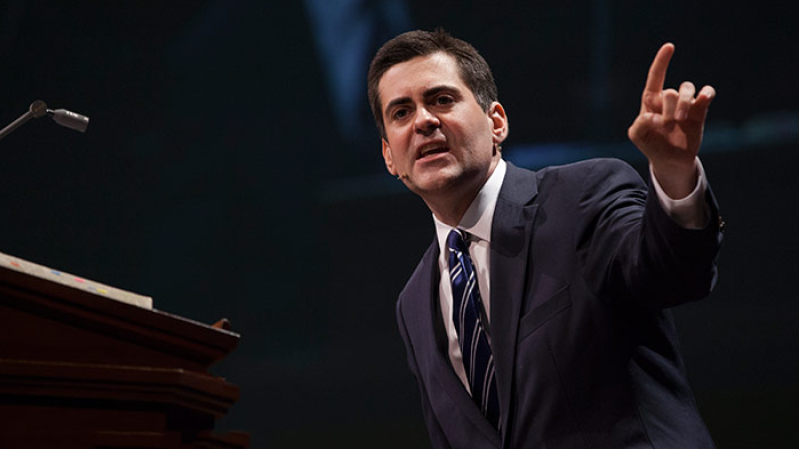
American evangelical theologian and preacher Russell Moore contended that the "religious right" will eventually win the heated culture war issue of same-sex marriage. Regardless of how the U.S. Supreme Court rules, he plans to stand by the definition of traditional marriage between a man and a woman.
In a phone interview conducted by Lila Shapiro of the Huffington Post, Moore elaborated on why he hasn't thrown in the towel on standing up against same-sex marriage. He is currently president of the Southern Baptist Ethics and Religious Liberty Commission.
"I've been predicting for years that the court is hell-bent on imposing same-sex marriage on all 50 states, so that's what I'm expecting the court to do," Moore said. "I've been surprised before, and I hope I'm surprised again, but I doubt it."
Shapiro asked Moore on how and when he made his predictions on same-sex marriage.
"I've been saying that for years ... same-sex marriage was coming to every part of the country," Moore said. "I didn't want evangelicals caught flat-footed the way that evangelicals were by Roe v. Wade, not anticipating that any such thing could happen."
Moore added that many evangelicals "wrongly believed" that same-sex marriage would be restricted to "a blue-state phenomenon" and would leave their communities untouched. He elaborated on the significance of the resolution passed by the Southern Baptist Convention, which stated that it "reaffirms its unwavering commitment to its doctrinal and public beliefs concerning marriage."
"If the court rules as I anticipate, evangelicals will still stand where we've always stood on marriage -- as a union of one man and one woman," Moore said. "We have no option to capitulate on that, because marriage in a Christian vision of reality isn't just a social contract. Marriage points to something beyond the natural order -- the union of Christ and his church."
Moore highlighted that Christians previously had to define traditional marriages throughout history.
"That's not a new situation for Christians -- that's what's happening in the context of the New Testament, defining Christian marriage over and against a Greco-Roman sexual culture," Moore said. "But it's a new situation for American evangelicals."
According to Shapiro, Moore thought that the future of standing up against same-sex marriage would rely on the model used by the pro-life movement.
"The pro-life movement is a long-term movement that is also multipronged, and that will be the case for the pro-marriage, pro-family movement as well -- to recognize that this isn't simply about a presidential election or two," Moore said. "It's about working in the political arena, but also working in the cultural arena."
Moore emphasized that Christians "have to stand with conviction and with kindness at the same time." Shapiro then asked him if the opposition to same-sex marriage made "tactical errors" in their advocacy; a majority of Americans now support gay marriage in a recent poll conducted by Pew Research.
"I do think that there were errors made on our side," Moore admitted. "For one thing, I think that many pro-marriage people assumed that we would always represent a majority in American opinion, and so the argument was always made in majoritarian terms -- that the same-sex marriage movement only represented elite judges and blue states. For a while, that was true."
Moore added that Christians in the United States should "be prepared to argue for something that is right regardless of whether or not the majority of Americans agree with us." He tried to justify why evangelical Christians like him stood up against same-sex marriage.
"Evangelicals don't dislike our gay and lesbian neighbors, and we don't mean them harm," Moore said. "We don't think that what they want -- same-sex marriage -- is going to give them what they want. So we need to constantly balance conviction and kindness, truth and grace at the same time."
Moore told Shapiro that explanations of Christian theology "in rich, robust terms" should have been the approach instead.
"Many people are just ignorant of what Christians and Mormons and Orthodox Jews and Muslims believe about marriage," Moore said. "So for instance, when someone would say 'Well, Christians are just going to have to get over this' -- Christians can't get over this. It was the same argument used in the late 19th and early 20th centuries about miracles."
Moore added that the same logic applied to what he described as "sexual ethics."
Even though Shapiro cited Pew surveys that indicated Americans dropping out from identifying as Christian, in particular young people, Moore countered that the survey also found that "evangelicalism" has stayed "remarkably steady in American life."
"I don't think that's an accurate reading of the way that Christianity ought to go forward," Moore said of the Pew study. "Christianity thrives best when we're distinct from the culture around us, not when we're a mirror image of it."
Moore stated that although religious conservatives may have lost "the short term" battle against same-sex marriage, he argued that Christians have to continue upholding traditional marriage. That's because the ideas of monogamy and what is considered a man and woman in society are also starting to be questioned by society.
"We have to be the people who are holding fast the way to the old paths on these things, because I really believe that this endless redefinition of marriage and sexuality will not be sustainable," Moore said. "I'm a short-term pessimist and a long-term optimist."







